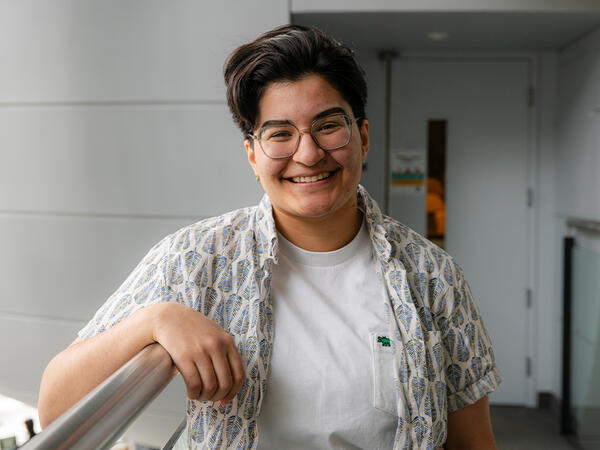Erin Chung says PhD at Leslie Dan Faculty of Pharmacy provided key skills to improve patient outcomes
Erin Chung, who convocates from U of T’s Leslie Dan Faculty of Pharmacy today with her PhD degree, has a strong connection to the Faculty. After completing a Bachelor of Science at McMaster University, she completed a Bachelor of Science in Pharmacy (BScPhm), followed by a combined hospital pharmacy residency and Master of Science at the Leslie Dan Faculty of Pharmacy. And she recently completed her PhD in pharmaceutical sciences, which she earned while working full-time as a therapeutic drug monitoring coordinator and pharmacist in the neonatal intensive care unit (NICU) at the Hospital for Sick Children (SickKids).
Supervised by Winnie Seto and Scott Walker, Chung undertook research that used population pharmacokinetics, which examines variability in drug concentrations in individuals, large health care data and machine learning to find optimal dosing regimens of medications for newborns, infants, and children. She received a Best Poster Award at the 2022 American College of Clinical Pharmacy conference and was one of the three finalists for a 2023 Association of Faculties of Pharmacy of Canada Student Research Poster Award.
We spoke with Chung about her experience at the Leslie Dan Faculty of Pharmacy and how her education will help her career.
Why did you decide to pursue a PhD at Leslie Dan Faculty of Pharmacy?
After my BScPhm, I completed a hospital pharmacy residency at SickKids and developed a strong interest in neonatology, paediatrics, and applying pharmacokinetics (how the body absorbs, distributes, metabolizes, and eliminates medications) to practice. I was using traditional pharmacokinetic equations to calculate the volume of distribution and clearance to determine patients’ medication dose requirements, but achieving target drug concentrations in the blood that are associated with best outcomes in every patient is still challenging. I had a strong desire to learn and apply more advanced pharmacokinetic modelling techniques to predict the most precise dose for each patient. I completed a master’s degree, where I had an introduction to these techniques and applied them in children receiving haemodialysis or haemodiafiltration, but I still needed to continue advancing my pharmacokinetic skills to solve other clinical problems that I encountered, and I decided to pursue a PhD.
At the Leslie Dan Faculty of Pharmacy, I was exposed to renowned professors with expertise in advanced hospital pharmacy practice and clinical pharmacokinetics. The program was also flexible, accommodated my work schedule, and allowed me to choose the specific courses that benefited my research the most.
In my current clinical roles at SickKids, I encounter many clinical problems and have a strong desire to solve them by conducting clinical research. I also hope through research and education to improve the role of pharmacists in applying therapeutic drug monitoring and pharmacokinetic skills to personalize dosing of medications for each patient and ultimately, improve their health outcomes. I’m currently working on getting my research results published and implementing them to NICU practice. Then I’m planning to apply the same skills I gained during my degree on other drugs and in other populations.
What is your favourite memory from your time at the Leslie Dan Faculty of Pharmacy?
I had the opportunity to participate in a couple of research competitions in recent years, such as the three-minute thesis competition and AFPC poster presentation. I’m grateful that the Faculty provided these opportunities for students to practise their communication skills, obtain feedback from their peers and faculty, and share their research findings.
Last year, I was one of two winners of the three-minute thesis competition at the Faculty. This competition helped me learn how to communicate my research to a lay audience and build my public speaking skills.
I also enjoyed attending the annual Graduate Research in Progress (GRIP) Symposiums and listening to the fantastic research done by fellow graduate students. I’m truly amazed by all the research done at our Faculty.
What have you valued most about your education at the Leslie Dan Faculty of Pharmacy?
The Faculty offered many opportunities to advance my skills in pharmacy and supported me to attend workshops and conferences. Having opportunities to learn and practise different pharmacokinetic modelling techniques and collaborate in research projects that linked directly to my day-to-day work has helped me in becoming a better pharmacist by delivering better evidence-based patient care and expert therapeutic drug monitoring consults. When a patient starts a medication that I’ve been studying during my PhD, I can advise the clinical team on the most appropriate dose associated with best health outcomes based on my research findings.
I have also really valued my supervisors, Winnie Seto and Scott Walker, and my advisory committee, Sandra Walker, Carolyn Cummins, and Christoph Licht (from SickKids), for their expert guidance, continued encouragement, and support.
How do you think your education from the Leslie Dan Faculty of Pharmacy will help your career moving forward?
I think one of the gaps in clinical practice is around the precision of dosing medications and being able to use population pharmacokinetic modelling to do that. In the past, dosing has been focused on using traditional pharmacokinetic techniques, but these have, limitations. In my research, I was able to apply more advanced population pharmacokinetic modelling to mitigate these challenges and improve precision of dosing for patients. This demonstrates that similar techniques that I learned during my PhD can be applied to solve similar precision dosing problems for other drugs.
After graduation, I hope to continue using my pharmacokinetic knowledge and skills that I gained during my graduate studies in my clinical practice and future research in collaboration with investigators at SickKids and other institutions to optimize medication dosing and health outcomes for newborns, infants, children, and beyond.
More News
Image

Faces of PharmSci: Mahya Rezaeifarimani
Supervised by Prof. Shirley Wu, PhD student Mahya Rezaeifarimani is developing smart nanoparticles to help make radiation therapy work better for brain tumours by targeting low-oxygen areas that often make treatment less effective.
Read More
Image

Dean Lisa Dolovich reappointed for second term
Professor Lisa Dolovich has been reappointed for a second term as Dean of the Leslie Dan Faculty of Pharmacy, University of Toronto, effective July 1, 2025, to December 30, 2030.
Read More
Image

Pharmacy Summer Camp gives high school students insight into pharmacy profession
A new summer camp based at the faculty will give high school students a range of experiences in pharmacy and pharmaceutical sciences.
Read More
